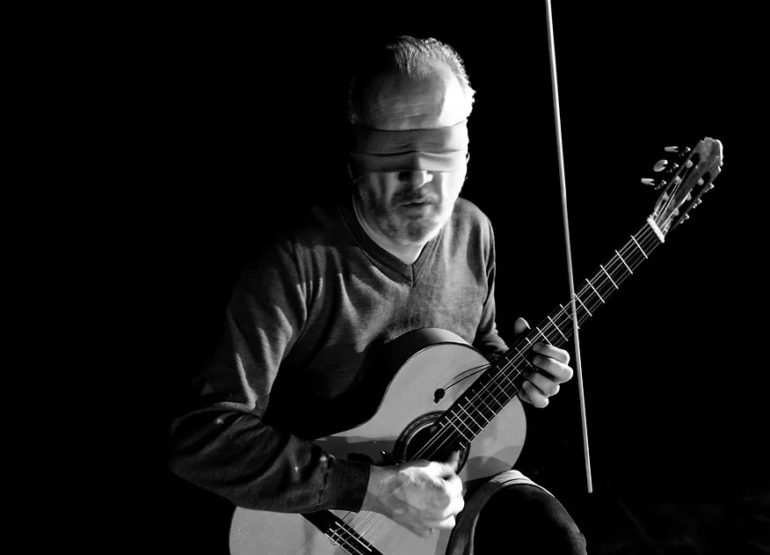Benjamin Dwyer’s music is forged from an intensive amalgamation of technical and interpretative elements. Experienced at the intersection of compositional, performance and improvisational praxes, his music is further enriched through its deep immersion in ritual, symbol, literature, dance, film and the intercultural.
As a classical guitarist, with an particular interest in 20th-century and contemporary music, Dwyer performs worldwide and has appeared as soloist with the RTÉ National Symphony Orchestra (Ireland), the RTÉ Concert Orchestra, the Irish Chamber Orchestra, the Neubrandenburg Philharmonic (Germany), the Santos Symphony Orchestra (Brazil), the VOX21 new-music ensemble, the Callino Quartet (UK) and the Vogler String Quartet (Germany).
As a free improviser, Dwyer is a member of Barry Guy’s Blue Shroud Band. With the Band, he has featured as a performer in the Krakow Autumn Jazz Festivals of 2014, 2016 & 2021, Frankfurt Opera (2018), and the EFG London Jazz Festival 2019 as a soloist and in the Blue Shroud Band Small Formations. He is also a founder-member of TIN (the UK-based Transdisciplinary Improvisation Network) and founder-member of Coterminous, a cross-disciplinary collective (dance, music, film, philosophy) that explores the concept of 'translative epistemologies’ (Nick Roth) through free improvisation. KnowingUnknowing, a work for improvised music and dance (with Helen Kindred), was premiered at London’s InsideOut Festival in 2016. In the free improvisation arena, he has performed with other leading exponents of the genre including bassist/composer Barry Guy, percussionist Lucas Niggli, trumpeter Peter Evans, saxophonist Nick Roth, vocalist Savina Yannatou, violist/composer Garth Knox, pianist Agustí Fernández, violist Charlotte Hug and percussionist Paul Lytton among others. In November 2021, Dwyer founded the New Pathways in Improvisation @MDX conference-event of which he is director. Hosted by Middlesex University, London, New Pathways… is a practice-as-research (PaR), cross-disciplinary, intercultural platform incorporating new research and live performances in music, dance, film, theatre, and sonic and fine arts.
As a composer, Dwyer’s works emerge out of a deep engagement with other cultures (Five Sicilian Preludes, Four Japanese Prints, Rajas-Sattva-Tamas: Percussion Concerto, Soneto del amor Oscuro, etc.). Recent compositions, releases and performances include the Beckett-inspired compositions what is the word (triptych with interludes), six residua (after Beckett) and five disjecta (after Beckett), all of which were released on Diatribe Records and launched at the New Music Dublin festival 2020 at the National Concert Hall. Based on traditional Japanese and ancient Greek musical forms, Umbilical is a textless version of Sophocles’ Oedipus Tyrannus for amplified ensemble and Butoh dancer (Sayoko Onishi). Drawing upon various shamanistic cultures (first-nation peoples, Inuit), creation mythology and Biblical studies, Scenes from Crow is an amplified mixed-ensemble work inspired by Ted Hughes’s Crow sequence; both Scenes from Crow and Umbilical were released on Diatribe Records. Dwyer’s large-scale multimedia work, SacrumProfanum (2021), emerged out of an intensive engagement with the ancient Gaelic carvings known as Sheela-na-gigs. Dwyer situates the Sheela as 'witness’ to Ireland’s colonial history, the destruction of its Gaelic traditions and attempts by various power structures to control the untamed power of the female body. Dwyer’s Twelve Études for guitar (recorded by the composer on Gamelan Records, 2008) has been described by Fabio Zanon as the ‘summation of an entire guitar epoch’; a second recording by Greek guitarist Smaro Gregoriadou will be released in 2022. The Fidelio Trio premièred Nocturnal, after Benjamin Britten at King’s Place London. Sobre los Ángeles, a song cycle for soprano and guitar on poems by Rafael Alberti, premiered at the Barrow River Festival in 2017 with Sylvia O’Brien. Tombeau sur la Mort de Claude Debussy for guitar was premiered by the composer at the National Concert Hall, Dublin in 2019.
Dwyer’s writing on music is chiefly informed by intercultural studies, continental philosophy, and postcolonial and feminist theory. He has written extensively on music exploring themes such as the tensions between indigenous Gaelic music and the art music introduced by English colonialism, the intersections of performance and compositional practice, philosophical perspectives on free improvisation, the classical guitar, and music as myth and symbol. He specialises in the works of numerous Irish composers, György Ligeti, Benjamin Britten and Barry Guy among others. Book publications include Britten and the Guitar: Critical Perspectives for Performers (Carysfort Press, 2017); Different Voices: Irish Music and Music in Ireland (Wolke-Verlag, 2014); and Constellations: The Life and Music of John Buckley (Carysfort Press, 2011). His influential essay, 'Transformational Ostinati in György Ligeti’s Sonatas for Solo Cello and Solo Viola’ appears in György Ligeti: Of Foreign Lands and Strange Sounds (Boydell & Brewer, 2011). Articles include: “‘…O Master of secret configurations…’ Reflections on the Adorno-Berg Correspondence” (The Musical Times, 2007); „’Dios los cría’—Barry Guy and Maya Homburger,” (Music & Literature, 2014); „Sheela-na-gigs and an 'Aesthetics of Damage’” (Enclave Review, 16); and 'Joycean Aesthetics and Mythic Imagination in the Music of Frank Corcoran’ (The Musical Times, 2019). In 2022, Wolke-Verlag will publish Music Autopsies: Selected Essays and Interviews 2016-2022.
As an educator, Dwyer’s extensive work in these fields gives him the combined skills to create teaching environments that are fluid and responsive to the broad needs of students and researchers today. Practice-as-research is a core element of his artistic work and teaching, as is research-led practice. His philosophy as an educator is grounded in the belief that the inter-relationships of disciplines and cultures are essential to understanding human relations.
